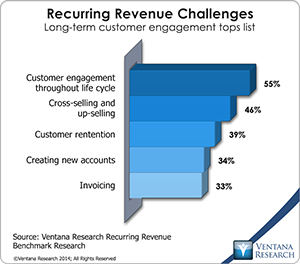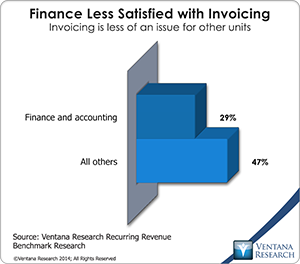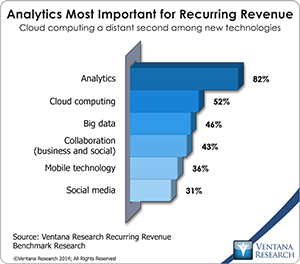Aria Systems provides companies with software for managing subscription or recurring revenue business models. A recurring revenue business models includes three types of selling and billing structures: a one-time transaction plus a periodic service charge; subscription-based services involving periodic charges; or a contractual relationship that charges periodically for goods and services. Aria’s cloud-based software addresses key requirements of users in the marketing, sales, operations and accounting functions in this type of business.
Recurring revenue, first popularized in the telecommunications industry, is increasingly common in others. It is well suited to companies accessing software and hardware technology as a service through cloud computing. For example, has a strong impact in the entertainment business, as customers subscribe to rent movies, music and other creative digital products instead of owning them. In general recurring revenue is attractive to providers of services or products because it establishes a regular, predictable income stream as long as they retain the customer. In using it it’s essential to handle interactions smoothly and completely in order to sustain customer engagement and maximize each customer’s lifetime value. Software is an essential element to successfully doing so.
Aria’s software is designed to help companies maximize customer lifetime value in three main ways. First, it is designed to help create a positive customer experience with every interaction. In our benchmark research on recurring revenue, maintaining customer engagement is the most frequently cited challenge in businesses that use it, cited by 55 percent of participants. Having repeated positive interactions can be an important determinant of renewal rates. Renewals in turn are a key driver of profitability in these businesses because of the relatively high cost of adding a customer. Along those lines, 39 percent of participants cited customer retention as an impediment. Moreover, since a company’s costs related to its recurring revenue business are relatively fixed in the short term, almost all the impact of lost revenue drops to the bottom line, depressing profits.
maintaining customer engagement is the most frequently cited challenge in businesses that use it, cited by 55 percent of participants. Having repeated positive interactions can be an important determinant of renewal rates. Renewals in turn are a key driver of profitability in these businesses because of the relatively high cost of adding a customer. Along those lines, 39 percent of participants cited customer retention as an impediment. Moreover, since a company’s costs related to its recurring revenue business are relatively fixed in the short term, almost all the impact of lost revenue drops to the bottom line, depressing profits.
Rather than treating billing as a purely functional accounting event, Aria’s software enables a company to automatically incorporate personalized usage tips or customized thank-you messages in anticipation of an approaching anniversary (and renewal) date. It also can automate up-sell and cross-sell messages tailored to each customer. Nearly half (46%) or organizations said cross-selling and up-selling are difficult. This may be because they can’t engage effectively with existing customers. Multiple internal factors may affect this, such as a poorly designed marketing program for existing customers, a lack of skilled agents for performing ongoing interactions or technology limitations that prevent a company from creating or executing an effective customer nurturing program. Using software to craft an automated process for deepening customer interactions can be a way to enhance engagement. Companies that find it difficult to up-sell or cross-sell also may discover that for some customers its primary service is of limited importance. This may be because they don’t want to consider a more expensive, deluxe version or add-ons. Understanding which customers fall into this category is important so that up-sell and cross-sell efforts are focused only on those who likely to be receptive. Aria’s software enables business people to manage these aspects of the billing process without involving IT professionals.
Second, to support positive customer interactions, the software offers flexibility to quickly create and modify customer offers in a controlled fashion. Aria has a centrally administered catalog that defines the products, services and bundles on offer as well as their pricing, terms and conditions. In addition the software can handle a range of things that a company can bill for, including types of content, service levels, usage metering based on physical quantities, time or distance or some combination of factors. Companies can define and manage offers based, for example, on the sales channel, geographic location or currency, and it can do that without requiring expensive and time-consuming customizations; thus a company can introduce innovations rapidly or react quickly to changes in its market. The control provided by such a catalog enables sales people to configure a set of terms and conditions that best match a current or prospective customer’s needs within established parameters. These limits ensure that the offerings balance flexibility and complexity. They enable administrators to limit the available pricing and terms to offers are that are profitable (or at least not loss-making) for the company.
 The third factor is that, by managing the billing process in a continuous fashion, Aria’s software ensures complete accuracy. For anything more than a simple subscription invoicing can be a chore because customers often add or remove services to and from their contracts or negotiate a new billing method to suit their needs. It’s easy for those outside of finance and accounting departments to overlook the impacts on the department of not having a controlled end-to-end process, which can be addressed by using a dedicated application designed to support the billing process in a recurring revenue business. In our research only 29 percent of participants with finance and accounting titles said they are satisfied with their company’s invoicing system, compared to nearly half (47%) of those who work in other parts of their company. Managing the billing process from contract to cash in a single system provides a control mechanism that makes sure that the customer is not overcharged and that the company doesn’t suffer revenue leakage. Another benefit of the software is that by managing the process from end to end it ensures the integrity of the data used in the billing process and eliminates the need for time-consuming checks and reconciliations that are necessary when, for example, the same data must be entered into multiple systems or when companies use spreadsheets at any point in the process to move data from one system to another or to handle adjustments or allocations. A well-designed billing system also facilitates the revenue recognition process.
The third factor is that, by managing the billing process in a continuous fashion, Aria’s software ensures complete accuracy. For anything more than a simple subscription invoicing can be a chore because customers often add or remove services to and from their contracts or negotiate a new billing method to suit their needs. It’s easy for those outside of finance and accounting departments to overlook the impacts on the department of not having a controlled end-to-end process, which can be addressed by using a dedicated application designed to support the billing process in a recurring revenue business. In our research only 29 percent of participants with finance and accounting titles said they are satisfied with their company’s invoicing system, compared to nearly half (47%) of those who work in other parts of their company. Managing the billing process from contract to cash in a single system provides a control mechanism that makes sure that the customer is not overcharged and that the company doesn’t suffer revenue leakage. Another benefit of the software is that by managing the process from end to end it ensures the integrity of the data used in the billing process and eliminates the need for time-consuming checks and reconciliations that are necessary when, for example, the same data must be entered into multiple systems or when companies use spreadsheets at any point in the process to move data from one system to another or to handle adjustments or allocations. A well-designed billing system also facilitates the revenue recognition process.
Some companies sell directly to customers either through sales people (assisted selling) or a commerce website (unassisted selling), and some do both. Where subscription-like services are concerned, using a centralized catalog as the authoritative source for controlling offers ensures that the offers are valid and consistent with policies. For directed selling, Aria’s offers integration with the salesforce.com CRM system to ensure data in the two systems is synchronized. The software can be integrated with a company’s e-commerce site and enable offers and promotions tailored to specific buyers based on their relationship with the company, their location, past buying history or other factors. For both types of selling, the software facilitates testing of plans, promotions and services to determine the best approach to use. Users can apply effective dating to turn promotions on or off automatically at set times.
Aria’s built-in analytics addresses the needs of various roles in managing the recurring revenue business. Analytics is necessary to measure and monitor the health of a business. Having up-to-the-minute data digested and displayed for specific roles and responsibilities supports faster, more coordinated responses to market developments. Confirming its importance, most (82%) of the participants in our research chose analytics as an important new technology necessary to support their recurring revenue business.
in our research chose analytics as an important new technology necessary to support their recurring revenue business.
Not every company needs a dedicated application to manage its recurring revenue business. Those with simple offerings that rarely change over the term of the subscription are likely to find that their ERP system will serve their needs. However, companies that have even moderately complex offerings, that serve a diverse set of customers or that need to be nimble in managing offers and promotions will find that a recurring revenue application improves their performance. Our research finds that users of dedicated third-party software said they are satisfied with its performance more often than those using any other method: 86 percent said they are satisfied or somewhat satisfied with it, compared to 70 percent of those that use their ERP system and just 40 percent that use spreadsheets. I recommend that companies that have recurring revenue businesses assess whether dedicated software can help their performance and, if they so decide, they should consider Aria’s offering.
Regards,
Robert Kugel – SVP Research













